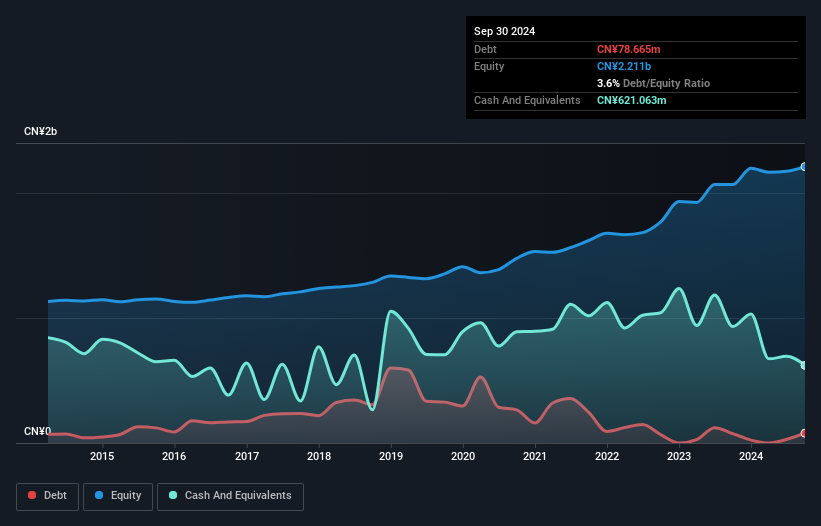Warren Buffett famously said, 'Volatility is far from synonymous with risk.' When we think about how risky a company is, we always like to look at its use of debt, since debt overload can lead to ruin. Importantly, Digiwin Co., Ltd. (SZSE:300378) does carry debt. But the real question is whether this debt is making the company risky.
Why Does Debt Bring Risk?
Generally speaking, debt only becomes a real problem when a company can't easily pay it off, either by raising capital or with its own cash flow. If things get really bad, the lenders can take control of the business. While that is not too common, we often do see indebted companies permanently diluting shareholders because lenders force them to raise capital at a distressed price. Of course, the upside of debt is that it often represents cheap capital, especially when it replaces dilution in a company with the ability to reinvest at high rates of return. The first thing to do when considering how much debt a business uses is to look at its cash and debt together.
See our latest analysis for Digiwin
What Is Digiwin's Net Debt?
You can click the graphic below for the historical numbers, but it shows that as of September 2024 Digiwin had CN¥78.7m of debt, an increase on CN¥75.5m, over one year. But it also has CN¥621.1m in cash to offset that, meaning it has CN¥542.4m net cash.

How Healthy Is Digiwin's Balance Sheet?
Zooming in on the latest balance sheet data, we can see that Digiwin had liabilities of CN¥802.4m due within 12 months and liabilities of CN¥61.1m due beyond that. Offsetting these obligations, it had cash of CN¥621.1m as well as receivables valued at CN¥678.6m due within 12 months. So it can boast CN¥436.2m more liquid assets than total liabilities.
This short term liquidity is a sign that Digiwin could probably pay off its debt with ease, as its balance sheet is far from stretched. Succinctly put, Digiwin boasts net cash, so it's fair to say it does not have a heavy debt load!
And we also note warmly that Digiwin grew its EBIT by 16% last year, making its debt load easier to handle. The balance sheet is clearly the area to focus on when you are analysing debt. But ultimately the future profitability of the business will decide if Digiwin can strengthen its balance sheet over time. So if you're focused on the future you can check out this free report showing analyst profit forecasts.
Finally, a business needs free cash flow to pay off debt; accounting profits just don't cut it. While Digiwin has net cash on its balance sheet, it's still worth taking a look at its ability to convert earnings before interest and tax (EBIT) to free cash flow, to help us understand how quickly it is building (or eroding) that cash balance. Over the last three years, Digiwin saw substantial negative free cash flow, in total. While investors are no doubt expecting a reversal of that situation in due course, it clearly does mean its use of debt is more risky.
Summing Up
While we empathize with investors who find debt concerning, you should keep in mind that Digiwin has net cash of CN¥542.4m, as well as more liquid assets than liabilities. And we liked the look of last year's 16% year-on-year EBIT growth. So we don't have any problem with Digiwin's use of debt. When analysing debt levels, the balance sheet is the obvious place to start. However, not all investment risk resides within the balance sheet - far from it. For example - Digiwin has 2 warning signs we think you should be aware of.
When all is said and done, sometimes its easier to focus on companies that don't even need debt. Readers can access a list of growth stocks with zero net debt 100% free, right now.
New: Manage All Your Stock Portfolios in One Place
We've created the ultimate portfolio companion for stock investors, and it's free.
• Connect an unlimited number of Portfolios and see your total in one currency
• Be alerted to new Warning Signs or Risks via email or mobile
• Track the Fair Value of your stocks
Have feedback on this article? Concerned about the content? Get in touch with us directly. Alternatively, email editorial-team (at) simplywallst.com.
This article by Simply Wall St is general in nature. We provide commentary based on historical data and analyst forecasts only using an unbiased methodology and our articles are not intended to be financial advice. It does not constitute a recommendation to buy or sell any stock, and does not take account of your objectives, or your financial situation. We aim to bring you long-term focused analysis driven by fundamental data. Note that our analysis may not factor in the latest price-sensitive company announcements or qualitative material. Simply Wall St has no position in any stocks mentioned.
About SZSE:300378
Digiwin
Provides industry-specific software solutions in Mainland China and internationally.
Flawless balance sheet with reasonable growth potential.
Market Insights
Weekly Picks


Crazy Undervalued 42 Baggers Silver Play (Active & Running Mine)


Fiducian: Compliance Clouds or Value Opportunity?

Willamette Valley Vineyards (WVVI): Not-So-Great Value
Recently Updated Narratives

Moderation and Stabilisation: HOLD: Fair Price based on a 4-year Cycle is $12.08


Positioned globally, partnered locally


When will fraudsters be investigated in depth. Fraud was ongoing in France too.
Popular Narratives


MicroVision will explode future revenue by 380.37% with a vision towards success


NVDA: Expanding AI Demand Will Drive Major Data Center Investments Through 2026





